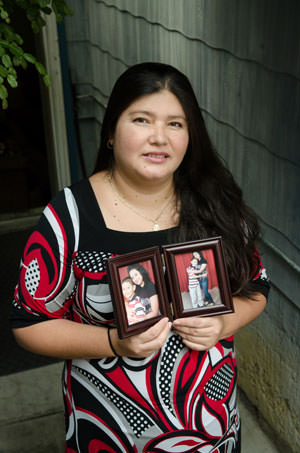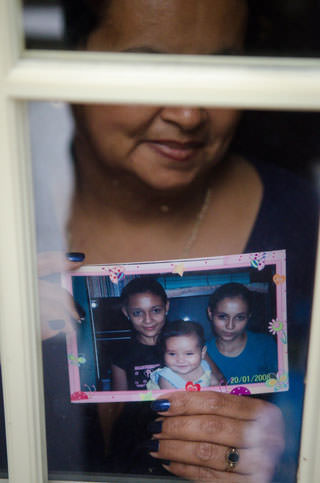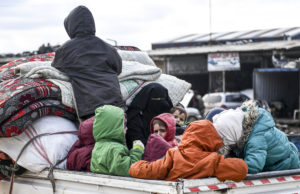Telephone Mamas: The Forgotten Dreamers
Our playgrounds are populated with mothers like these, women who send trinkets and duct-taped packages back to their babies in faraway countries. They call them babies, even if they are not babies anymore, because it’s a habit.
The names and some minor details in this story have been changed to protect the privacy of those involved.
Photos by Paul C. Miller.
I know three women who mother their children from afar: by check, or Western Union, or dollar bills tucked into letters. They mother by telephone, or text message, or Hallmark cards sent through a mail service so unreliable that by the time the news arrives it is already old. They mother by way of presents stuffed into suitcases on their way to El Salvador — which could just as well be any other country south of the border: Mexico, Guatemala, Honduras, Nicaragua.
Like the tens of thousands of Latin American children who have been captured crossing the border, these mothers have paid in dollars and in blood to cross la frontera, all in the name of a job, in the name of freedom, in the name of an honest living. We call them illegal, because they’ve broken our immigration laws. Some call them irresponsible. Some call them heroes. But all those lost children have reminded our nation that these “undocumented aliens” are living, breathing souls carrying around stories that you wouldn’t believe. Those who do not send their children put their own bodies in front of their children’s — the way you might throw yourself in front of a truck to save your own flesh and blood.
Beatriz sends home futbal shorts for her boy and lavender Gap sweatshirts for her girl. Valeria sends home a “Dora the Explorer” miniature inflatable sofa and a blonde Barbie. Jazmin sends home Avon’s Far Away lotion until her girls start liking its Today lotion even more.
Their stories come to me in the sandbox, over plates of hot quesadillas, behind closed doors, whispered over the heads of my sleeping babies. I have been collecting border crossing stories for 10 years now, since I lived in Mexico, worked as a social worker, became a writer, became a mother. I imagine they talk to me because (even though I am white and of a different class) I speak fluent Spanish, I ask questions — and, despite our differences, motherhood unites more than it separates. Sometimes these women pause to unburden their secrets. The weight of them overwhelms me.
One left behind a dead husband, a smashed-up car, unpaid hospital bills. Two left behind men who drank, worked too little,beat them one time too many.
Our playgrounds are populated with mothers like these, women who send trinkets and duct-taped packages back to their babies in faraway countries. They call them babies, even if they are not babies anymore, because it’s a habit. They call them babies because in the photographs held in their minds, their half-grown children are frozen in time.
Each has risked arrest, robbery, rape. Death comes by heatstroke; drowning in the Rio Grande; or the bullet of an Arizona vigilante, a Texas rancher, an overzealous border patrol officer. They have suffered humiliations: wearing diapers because there was no bathroom for 22 hours in a sealed truck, where men could grope them up and down, as it moved through foreign countries on their way from there to here. They have risked losing husbands and lovers, mothers and fathers, uncles and aunts, their own offspring.
Each has given up moments that cannot be returned: Beatriz missed the day her daughter first got her period and the day her son got caught cheating, along with the opportunity to teach him not to cheat. Valeria missed the day her daughter Esperanza lost her first tooth and her first day of kindergarten. Jazmin missed the day her 14-year-old came home pregnant by a no-good man, and the chance to save her child from repeating her mistakes. Jazmin missed holding her papa’s hand as he died and getting to say misa at his funeral. All of them have missed birthdays, christenings, communions, marriages and funerals — as well as those everyday moments you take for granted until they are gone.
Each has risked losing her children’s love with every time she could not answer through the static telephone line the question: When are you coming home, mami?
They compile excuses: when the laws change; when I save enough money; when President Bush passes that law; when President Obama gets elected; when President Obama lives up to his promises.
Telephone mothers populate our most intimate spaces: our kitchens, our bathrooms, our playgrounds. We entrust them with the chores we would rather not do: cleaning our toilets and wiping our babies’ bottoms. We entrust their men to cook our food, work our land and fight our wars, but not to drive a car, get a degree or vote. We refuse to confer on them the constitutional rights that brought them to our shores. Your tired, your poor, your huddled masses yearning to breathe free. We’ve forgotten the promises made by our forefathers. They have not. Beatriz and Her Other Sons
Beatriz showed up on my San Francisco doorstep with her vacuum cleaner, and her mother, some 10-plus years ago. Although she is 34 to my 46 years, and I am “boss” and she is employee, I have as much respect for her as I do for my friends with three Ph.D.s. She’s wise in ways that an Ivy League education doesn’t grant; she carries that inexplicable One-Must-Keep-Going Latina faith in God. I’ve shared as many secrets with her as she’s shared with me in the laundry room, over stacks of diapers, onesies, first-day-of-kindergarten outfits, first baseball cleats. Beatriz has borne witness to my life — watched me move in and out of three houses, grow and birth two babies, fall in and out of love, marry and divorce; she’s taught me things about mothering and life that even my own mother did not.
Beatriz was 12 when her mother left for the U.S. The two of them, now reunited, clean houses side by side. Unlike most immigrant nannies, Beatriz and her mother have a Temporary Protected Status due to the papers granted refugees of the 2001 earthquake in El Salvador. But traveling with a TPS is risky and does not guarantee safe return to the U.S. If Beatriz went back to her children, she’d have to trade in everything she has here: her job, her new husband, her mother, her children’s college tuition back home, these other woman’s sons.
Sometimes I walk through the tension that lies between Beatriz and her mother. Her mother likes to say, “Ay she’s so meticulous, she cannot bear to leave even a receipt on the counter!” I wonder whether this is a way to say, if I had raised you, it would have been different. Or whether it’s a way to say I’m sorry I left, I didn’t know what else to do. I wonder whether Beatriz had to repeat her mother’s journey in order to understand.
Beatriz left El Salvador in a hurry when her son was 3 years old and her daughter was 5. Her husband punched her in the face — in front of the kids. It wasn’t the first time, but it was the last. The police did nothing. As most Latin Americans will tell you, police corruption is notorious. La policia were friends with Beatriz’s husband, who was friends with the narco-traficantes — the drug dealers who rule the streets. Struggling to understand what it’s like to live in a country where violence is so prevalent, I asked, “Can’t you just go back, open a store? Start a business? You’re so smart. You could do anything.”
She shook her head. “You have no idea what it’s like,” she said. “They own everything — if you own a store you have to pay them off.” Her mother-in-law defended Beatriz’s husband and made a threat that still stands in the way of Beatriz ever going back. “The only reason I’m not going to have you killed is because you’re the mother of my grandchildren,” her mother-in-law had said.

When my babies were only 4 pounds, 7 ounces and 5 pounds, 9 ounces, Beatriz used to pick up one twin with the ease of a woman who’s raised plenty of babies; she’d balance him over her shoulder, while juggling a pot of boiling water, glass bottles and silicone nipples floating around like buoys in the ocean.
Beatriz planned to leave El Salvador for only a year or two, to save enough to buy a little house back home. That year turned into five, seven, nine, 11. Her daughter will be starting college next year.
Sometimes, even though it was not her job, she would swaddle my babies up like tamales with all the love that’s left over, and then some. One day, when Beatriz leaned over to pass me my son, I noticed her earrings: baby teeth dangling from gold clasps.
Because she cannot carry her children, she carries pieces of them.
Valeria: The Golden Cage
Valeria began with her second twin family in San Francisco when the twins were 5 weeks old and small enough to fit into the father’s hat. She looked too young to know anything about babies but at 24 she knew things that the new mother didn’t know at 38. Valeria swept in like Mary Poppins and taught her how to calm an inconsolable baby, how to laugh even when you’re low on sleep and patience, how to rock one twin in the car seat with the tip of her toe, while burping the other across her left shoulder. Valeria looked the babies in the eyes and crooned, in Spanish, “How much do I love you?” She would spread her arms and say, “This much? No … this much? No … this much?” until they were as wide as they could possibly go. Then she would say, “Te amo, te amo, te amo!”The mother said that Valeria became mother, sister, daughter. I’ve heard countless mothers say this of their nannies; they are part of the family. When Valeria was with those babies she was always giggling, but when she’d walk through the front door in the morning, you could see the black rings under her eyes. She told me that she had not slept through a full night in the four years since leaving her 3-year-old daughter. When her husband’s car crashed and Valeria became a widow at the age of 19, she didn’t have the money to pay the hospital, let alone the rent and clothing and milk expenses for her daughter.
Valeria knew how to blow bubbles with soap, water and two bare hands. She knew how to make hats out of paper bags and how to make children obey by tickling instead of scolding. Sometimes her boss would find her sleeping with the twins balanced like the letter V across her chest. In the peace and quiet she granted, the mother would tiptoe out to work, to pay bills, to take the shower she hadn’t been able to in days.
It took Valeria two years to pay off the $6,000 she owed the coyote, the smuggler. She told me that some Salvadoreños call the U.S. una jaula de oro, a golden cage.
After five years in San Francisco, and two different families, and two sets of twins, Valeria went to her boss. “I can’t do this anymore,” she said. “I want to go home.” Esperanza had just turned 8. She’d said, “Mami, you don’t love me anymore.”
Against the tsk-tsking of the nannies in the park, Valeria did the unthinkable: She crossed back to El Salvador, forfeiting her friends, her flush toilet, her Starbucks lattes, the babies she’d raised, her devoted boyfriend, her paycheck.
Jazmin: On Borrowed Time
Jazmin left behind two daughters, a husband who beat her and the girls with a belt, a job in a bra factory that paid $2 a day, and an aunt and a cousin who crawled out of a dirt pile dug by the Death Squads, in the village of Teosinte in Chalatenango, El Salvador, back in the 1980s.

Now Jazmin cleans houses and carts around other people’s babies. Her skin is the color of cocoa and she is ironically funny, in the way that only people who’ve suffered can be.
I can’t tell you exactly how I met Jazmin or Valeria, or what led them to trust me with the private details of their lives, but I can tell you that I know their stories are true. I wouldn’t have believed how much a person could give up for her children — until I had my own.
One afternoon, a few months ago, I got a text from Beatriz: “Jazmin’s daughter has died. I think she’d want you to know.”
A week earlier I had heard that Jazmin had a new grandchild. I had congratulated her in that awkward way one congratulates a person who probably will never meet her grandchild.
The next time I saw her at her boss’ house she was hunched over a sink full of dishes, a gold cross dangling from her neck. I felt the injustice of our differences — ridiculous for the smallness of my own worries.
Jazmin’s daughter,Telma, had been 21. She had just given birth to a baby boy. “Nobody knew what went wrong. Nobody could explain,” Jazmin said. When Telma’s husband and sister went to the hospital she was gone. First the doctors said she’d been moved. Later they claimed she died after an operation to fix an infection. Her heart gave out.
Telma’s baby had meconium poisoning but he was going to be OK — physically that is. His grandmother could not wrap her arms around him or change his diapers or tell him or his two sisters about what his mother was like. Jazmin might have told him that Telma had waist-length black hair and ivory skin. She would not have told him what Jazmin told me, that “Telma was the one who said the world is black when you said it was white. …” The one who got pregnant at 14 when she could have gone to college. The one who would not stop asking, “When are the three of us going to be together again mama, like it used to be?”
Jazmin’s boss asked whether she wanted to go outside, to take her pay, to go home, meaning her home that is here. It was only four days since Telma’s death. Jazmin was in the shower stall, working on the glass, her feet standing in 2 inches of soapy water. She said she’d rather work. She said, “God only loans us our children. Our time with them is borrowed.”
And to the question of going home to El Salvador she answered, “The funeral is $700. Someone has to pay.”When Jazmin left her employer’s home, every last crumb of the children’s breakfast cereal had been vacuumed from the floor. The trail of ants that usually marched around had vanished. The bottom of the sink was visible, the children calm.
I shared Jazmin’s story with the mothers at my sons’ school. We collected 200 pounds of clothes and toys for Telma’s children, but none of those boxes could replace a travel visa, getting to touch the dirt where your daughter is buried.
My Other Mother: Paula
When my own nanny died, the thing that haunted me most was that I never got to say goodbye, attend her funeral, touch the dirt on her grave. In the recurring dreams that haunted me into adulthood, I’d run into her sagging, paper-thin-skinned arms, speckled with age spots, and I’d say, “I’m sorry, I’m sorry, I’m sorry.” I was sorry for taking her for granted. Sorry for showing more respect to my real mother than I showed to Paula, the one who raised me, the one who lived in our house from birth until I was 15, the one who wiped my bottom when I was a baby and who fed me, burped me, pushed me down the street in the navy blue stroller with the hood on top, the one who cooked my dinners, wiped the vomit from my lips when I had the flu, the one I talked back to when I was embarrassed that it was her at pickup from ballet class (not my biological mother), the one whom I crawled into bed with at 4 a.m. when I had nightmares; it was she whom I missed when I walked down the aisle and when my babies were born.
Paula was German and she came over at a time when there was no problem obtaining a work permit for people of European ancestry. I remember the day that she took her citizenship test and passed. But like Beatriz, Valeria and Jazmin, she was separated from her family. She never had her own children, but we became her children; our family became hers, although it was an imbalanced puzzle.
When I was 15 I came home from my first sleep-away-camp to find Paula in the hospital, blue tubes up her nose, an oxygen mask across her face, and the diagnosis of cancer stamped across her medical chart. I stood there in my blue school uniform, my knee socks sagging. “Don’t cry,” she said, offering her bruised and shaking hand. I rode the bus home alone through Harlem, watching the skin color of passengers change; I was lost in a foreign land. On a tiny Hallmark card I scrawled a note: “I love you like a mother.”
A few days later I came home from my elite private school to discover Paula’s presence erased as cleanly as a blackboard. Her button-up-to-the-top and down-below-the-knee dresses, her brown wig and nurse shoes, her cartons of True cigarettes and glass ashtrays were all cleared out of her tiny back room with the fire escape out the window. All I could find was one white ladies’ glove in a drawer, and a small row of old fashioned diaper pins with yellow and blue ducks on them. Her photo was absent from family photo albums even if she was present in each memory. My glamorous, high-heeled, globe-trotting, miniskirted mother appeared for the family photo shoots — the framed product a glossy copy of a smiling family that is not the one I have any recollection of.
I was 27 when I finally found Paula’s grave, in Paramus, N.J. The woman with the long purple nails said, “Number 507 — right over there.” There were miles and miles of rolling hills and beautiful tombstones under weeping willows, but Paula’s grave was a metal slab on the meridian of the parking lot. A metal slab shared with nine other strangers. It said her name, her date of birth and date of death. It was the kind of grave you might give to Jane Doe, not someone who had lived on the Upper East Side of Manhattan, raising children from at least three aristocratic families. It was like a bad joke. I knelt in the dirt and cried.
Today, when I see my boys climbing to the highest branch of our apple tree, a pit of fear rises in my stomach. I hear Paula’s postwar pessimism rising up in me: “You better come down or you’re going to crack your head open!” I reframe her words as “be careful!” Then I step back and watch my boys climb with agility, ease and the kind of courage I’ve never had. But when Quinn falls hard I scoop him up into my arms and hold him the way Paula held me.
In the last six years I have lost a marriage, a house, a husband. My boys now travel back and forth between my house and their papa’s house, carrying a little orange blanket and a bunny who is so worn that one eye is falling off.
I don’t have a nanny anymore because my kids are bigger, I have them only three-quarters of the time and I can no longer afford it. Beatriz helps with occasional cleaning and sometimes a few hours of emergency child care if my boys’ illnesses or emergencies happen to fall on the half day she is free.
Some days, when Beatriz comes over, I am so exhausted and sick from the latest virus the kids have given me, my patience is bone thin from the bruise on my right shoulder from where Quinn has bitten me and my throat is raw from hollering at Aidan to stop telling me that I’m stupid or that he loves his papa more. Sometimes mothering feels so hard that I cry, or slam the pot down or feel sorry for myself because life turned out different from what I expected.
Then Beatriz shows up and finds a way to make Quinn put on his pirate jacket and in the 10 minute break she has given me, I rediscover my patience. I remember to feel grateful for the smell of lavender in Quinn’s hair and the heat of Aidan’s breath against my eyelashes.Second Crossing
One day, I got word that Valeria was trying to come back. For over a year in El Salvador, Valeria could not find work. She went from earning $18-$20 an hour to jobs that pay $2 a day, not enough to send her daughter to school and pay for food on the table. At 25, she was deemed too old (in a culture that now discriminates openly on job applications) and too under-educated to find honest work.
Valeria collected a new load of courage (along with a new debt) smuggling herself and now 9-year-old Esperanza back over in the trunk of a car. Unlike most women and children who make this journey, they did not get raped, arrested, or killed. They made it unharmed.
I saw Esperanza when she first came over. She was beautiful, with long black hair and big black eyelashes just like her mother’s. Unlike her mother, she was shy and looked afraid of everything. She stood awkwardly in the corner of my home, looking around at all the toys — the big house, the big yard, the boxes and boxes of toys, sprawled messily across the room. I saw for a moment what she must have seen, and I felt ashamed.
Valeria told me how much Esperanza missed her grandparents, her language, her friends. In only a few months however, she was wearing sparkly Gap sweatshirts, learning to speak English better than her mother, beginning to smile. Valeria’s old boyfriend won her back. Valeria got a new job. They gave birth to a baby, named after Valeria’s little brother Daniel — the one who got shot by banditos at 23 while standing outside his parents’ house in San Salvador, chatting with the neighbors.
Danielito will get to vote because he was born here, and when he gets big enough, he can submit papers to make his mother a citizen — that is, in 16 years.
Sometimes Valeria, Jazmin and Beatriz see one another at parties in Daly City, Calif. Beatriz and Jazmin watch Valeria touch her daughter’s hair; they watch Danielito waddle and nearly topple as he walks toward her and up into her arms. Uno, dos, tres: andale!
Beatriz’s son is now 16 and her daughter is 19 and going to college next year. Beatriz has fallen in love with Julian, a hardworking man whose 12-year-old son also lives back in El Salvador. Sometimes he gets down on the floor and plays cars with my sons. My boys run toward him when he comes to visit. He throws them up in the air, tosses them one by one over his shoulder, holds them upside down until they’re laughing so hard they cannot stop; they beg for more, more, more. “He’s so good with the boys,” I say. Beatriz nods. “I know,” she says.
One month ago, Beatriz and Julian gave birth to a little boy, 8 pounds, 9 ounces, 20¾ inches. He is named after two grandfathers he will never know. I took them a pot of soup and a box of glass baby bottles. I wanted to take them the world.
Julian received a deportation notice last year, but he must wait another year for his court date. They live day to day now, waiting for the government to decide whether it will grant amnesty — whether he will be forced to leave Beatriz and return to his son. It’s not clear which decision will hurt more.
“Are you going to cut down your work hours?” I asked. She smiled, handing me the baby, a shock of black hair sticking up, his head still wobbly. His tiny heart beat against my chest, and I remembered the weight, the awe, the responsibility one feels in holding another woman’s baby. Beatriz whispered, “Something has to change.”
Your support matters…Independent journalism is under threat and overshadowed by heavily funded mainstream media.
You can help level the playing field. Become a member.
Your tax-deductible contribution keeps us digging beneath the headlines to give you thought-provoking, investigative reporting and analysis that unearths what's really happening- without compromise.
Give today to support our courageous, independent journalists.






You need to be a supporter to comment.
There are currently no responses to this article.
Be the first to respond.